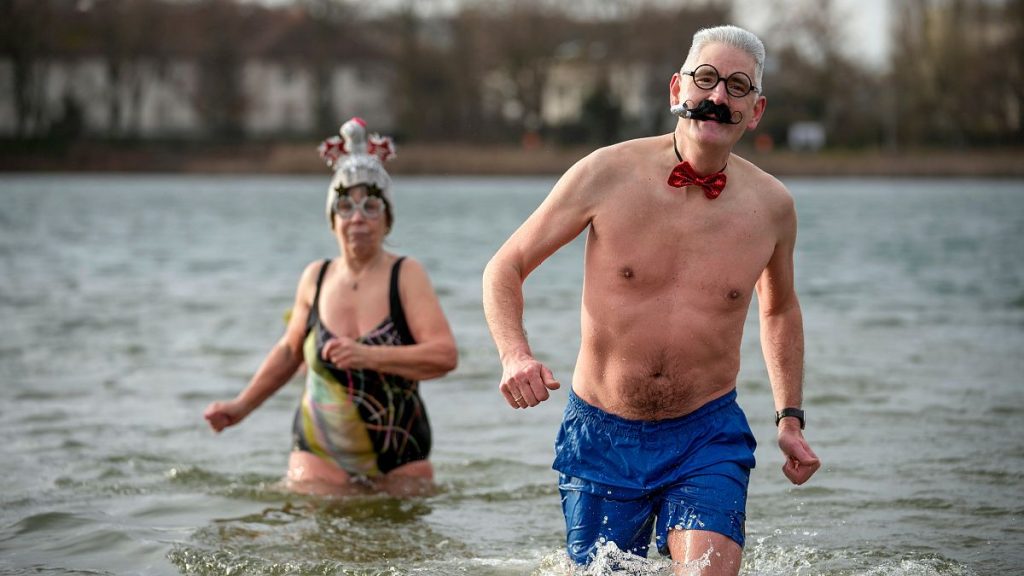The dawn of 2025 witnessed a vibrant tapestry of New Year’s traditions across Europe, ranging from invigorating plunges into icy waters to the passing of symbolic torches. While many sought solace and recovery indoors after the preceding night’s festivities, others embraced the new year with exhilarating displays of physical and cultural fortitude. Germany and Italy, in particular, showcased unique celebrations that blended time-honored customs with the sheer thrill of embracing the elements. These events, while diverse in their expression, shared a common thread of community and a spirited welcome to the year ahead.
In Berlin, the members of the Berlin Seals swimming club upheld their annual tradition of ice bathing, plunging into the frigid waters with unbridled enthusiasm. Braving temperatures of 6°C in the water and 4°C in the air, these hardy souls transformed the chilly plunge into a festive occasion, filled with swimming and dancing. For them, the icy immersion represents not just a physical challenge but a symbolic cleansing and a refreshing start to the new year. Harold Kraft, a member of the Berlin Seals, encapsulated the spirit of the event, highlighting the fun, invigorating nature of the tradition, and its integral role in welcoming the New Year.
Across the Alps, in Rome, a different but equally dramatic spectacle unfolded. Three daring divers took the plunge from the 18-meter-high Cavour Bridge into the Tiber River, continuing a tradition that stretches back to 1946. This year’s dive carried added significance as Maurizio Palmulli, affectionately known as “Mr. Ok,” and the individual who revived the tradition in 1989, officially passed the torch to fellow veteran diver Marco Fois. Palmulli’s decision to “hang up the swimming suit” marked a poignant moment in the history of the dive, signifying the passage of time and the continuation of a beloved custom.
Fois, accompanied by divers Walter Schirra and Simone Carabella, executed a spectacular jump into the Tiber, watched by onlookers and a team of firefighters positioned strategically on a dinghy to retrieve the divers from the water. This carefully orchestrated ritual, with its blend of daring athleticism and symbolic passing of the guard, underscores the importance of tradition and its evolution over time. The dive, a testament to human courage and the enduring power of symbolic acts, serves as a vibrant focal point for the city’s New Year celebrations.
While Germany and Italy embraced their respective aquatic traditions, the Netherlands experienced a different outcome. The hugely popular New Year’s Dive at Scheveningen beach in The Hague, which typically draws around 10,000 participants eager to take a dip in the frigid North Sea, was unfortunately cancelled due to strong winds. This cancellation marked only the second time in the event’s history, with the previous cancellation occurring in 2007 for the same reason. The absence of this popular tradition undoubtedly left a void in the New Year celebrations for many, highlighting the unpredictable nature of the elements and their impact on even the most well-established traditions.
The contrasting experiences of these European nations underscore the diversity and resilience of New Year’s traditions. While some traditions persevered despite challenging conditions, others were forced to yield to the forces of nature. However, the spirit of renewal and the desire to mark the passage of time with meaningful rituals remained a constant theme across these varied celebrations. Whether through icy plunges, symbolic dives, or quiet reflection, the arrival of 2025 was met with a blend of anticipation, excitement, and a commitment to upholding cherished customs, both old and new.
The stories of these European New Year’s traditions offer a compelling glimpse into the human spirit and its enduring capacity for celebration, resilience, and the honoring of cultural heritage. From the icy embrace of the Berlin Seals to the dramatic dives into the Tiber, and even the wind-swept silence of Scheveningen beach, each tradition reflects a unique cultural expression of welcoming the new year. These events, in their varying forms, underscore the universal human desire to mark the passage of time, to celebrate the promise of a fresh start, and to connect with community through shared rituals. They also demonstrate the ability of traditions to adapt and evolve, even as they remain rooted in their historical significance.

